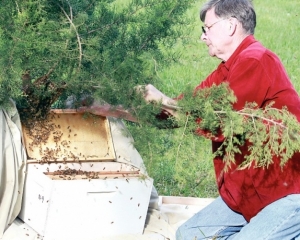All buzz, no threat
By Phyllis Moore
Published in News on April 30, 2012 1:46 PM

News-Argus/BOBBY WILLIAMS
Bill Thering, president of Beekeepers of the Neuse, removes a swarm of honeybees from a cedar tree near his home. This is the time of the year when beehives will divide. Residents are urged not to destroy the bees but contact a beekeeper who can relocate the hive.
Encountering a swarm of bees doesn't have to be cause for alarm.
While the mere sight of them might be upsetting, the first rule of thumb, beekeepers say, is not to aggravate them.
"They're not life-threatening or damaging to any home, but don't mess with them," advises Bill Thering, president of Beekeepers of the Neuse, recently formed in Wayne County.
He is also president of the Neuse Regional Beekeepers in Kinston, established in 2005, part of the N.C. State Beekeepers Association, the largest affiliate in the country.
They get calls all the time from homeowners, he said, frantic and wanting immediate removal of the intruders.
There's really no danger, he reassures.
"There are no African bees in North Carolina -- it's just a movie horror story," Thering said.
But a little education wouldn't hurt.
"This time of year, the biggest thing to be aware of is that this is the swarm season," he said, which will probably last another two weeks.
Bees seek out any open space that will meet their needs.
"A colony splits in half. They try to find a new home," he said. "The swarm is a group hung together waiting to find a new home."
If there's a concern, call a beekeeper to collect them, he suggested.
"The object is to get the queen," he said. "(We put) them in the box so that the rest of them will recognize that's where they need to go. When it comes to collecting a swarm, it's free of charge -- unless there's a physical removal from a structure -- because it's a benefit to the beekeeper to collect those swarms.
"We know that people have got kids and worry, but the swarms are non-defensive."
Exterminators are not licensed to kill bees in North Carolina, he pointed out.
"It's actually against the law for exterminators to kill honeybees," he said. "Homeowners can do what they want on their own property but exterminators are not licensed to do that."
Besides that, and perhaps most importantly, Thering said, is the fact that bees are facing extinction and serve more of a purpose than most folks realize.
"Basically every third mouthful of everything that this country eats is related to bees," he said. "You're going to have about 5 percent of the apples that you have, vegetables will be non-existent, or not as good quality. Without proper pollination, fruits and vegetables will not form properly. They'll be smaller and you will not have the production or the quality you have now.
"Almonds are only honeybee-pollinated. Without bees, you wouldn't have almonds producing. They're (bees are) important to about 30 percent of what you eat every day."
Even milk production is impacted by the circulation of bees, Thering said, since they pollinate the alfalfa that cows eat.
"It's far more reaching than the pretty little flowers in the yard," he said.
Perhaps because of that, beekeeping is not a lost art, he said.
"We do have schools every year where we teach beekeeping," he said. "We had one in January. As many as 39 show up.
"It's a very interesting hobby and environmentally beneficial."
Meetings are held the second Monday of each month at 7 p.m. at the Cooperative Extension office. New members are welcome, Thering said.
For more information, or to acquire the services of a beekeeper, call 735-1983.
